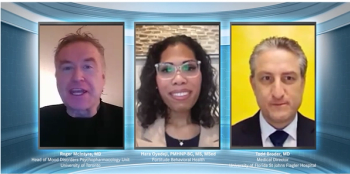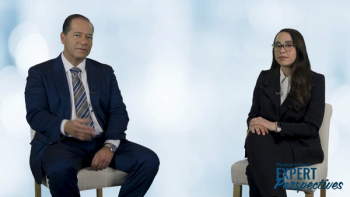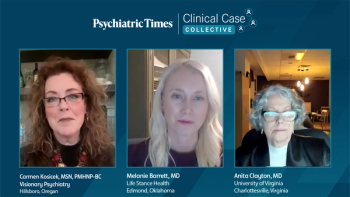
Videos



Cannabis use disorder and schizophrenia both peak in prevalence around the same age. Is there a cause-and-effect relationship?

"Driving the Garden State Parkway to New York, I pointed out two crows to a woman who believed crows always travel in threes..."

Learn more about the American Society for Adolescent Psychiatry from member Chad Lennon, MD.




Are we in the beginning stages of divorce proceedings from our love affair with the environment?

Mark Viner, MD, shares his thoughts on the place cannabis holds in psychiatry and addressing the stigma cannabis faces.

Wilsa Charles Malveaux, MD, MA, FAPA, explores the intersection of mental health and sports, using innovative technology to enhance athlete performance and well-being.

The new child and adolescent section editor for Psychiatric Times offers his thoughts on how best to engage with youth patients.

Explore the challenges of adolescent mental health and the impact of stigma.

As cannabis transitions from an illicit drug to a multi-billion-dollar industry, psychiatry faces both challenges and opportunities in exploring its therapeutic potential while balancing the risks.

Early phase 3 results show that a single dose of MM120 can rapidly reduce anxiety symptoms in GAD patients, with effects lasting up to 12 weeks.

Psychiatric Times spoke with Altha Stewart, MD, to discuss Black history in mental health care and strides the psychiatric community is making to ensure a more inclusive future.

Mena Mirhom, MD, FAPA, introduces his new column focused on mastering media as a mental health clinician.

"She walks in beauty, like the night, Of cloudless climes and starry skies; And all that’s best of dark and bright, Meet in her aspect and her eyes..."

Melanie Barrett, MD; Anita Clayton, MD, and Carmen Kosicek, MSN, PMHNP-BC, discuss how optimizing SSRI dosage, potentially augmenting with another medication class, and intensifying psychosocial support helps address breakthrough PPD symptoms in mothers with partial response to current SSRI treatment.

Melanie Barrett, MD; Anita Clayton, MD, and Carmen Kosicek, MSN, PMHNP-BC, discuss how a mother's persistent PPD symptoms despite SSRI treatment necessitated a comprehensive reevaluation of medication dosage, additional therapeutic interventions, and closer monitoring of treatment response to achieve better symptom control.

Unlocking peak performance starts with the mind—Wilsa Charles Malveaux, MD, MA, FAPA, breaks the stigma around mental health in sports.

With an FDA Breakthrough Therapy Designation, what are the next steps for MM-120?

Is love a dirty word in psychiatry?

By addressing grief, loss, and sport-specific treatment needs, she helps athletes recover mentally and return to peak performance.

How best can a clinician advise their patients during hardships?

MindMed has announced the first patient has been dosed in its phase 3 study Panorama.

How has the role of the nurse practitioner changed in psychiatry?

"When she steps onto the front porch, sun shimmies through the tips of her hair, the V of her legs, fans out like wings under her arms..."

Melanie Barrett, MD; Anita Clayton, MD, and Carmen Kosicek, MSN, PMHNP-BC, discuss how prompt intervention combining psychotherapy, social support mobilization, and potential medication options provides comprehensive care for the mother experiencing PPD symptoms at 12 weeks, with emphasis on both immediate symptom relief and long-term recovery strategies.

Melanie Barrett, MD; Anita Clayton, MD, and Carmen Kosicek, MSN, PMHNP-BC, discuss how a mother's PPD symptoms emerged gradually through increasing anxiety, intrusive thoughts, and emotional detachment, ultimately leading her to seek professional help after her partner noticed concerning behavioral changes at 12 weeks postpartum.
